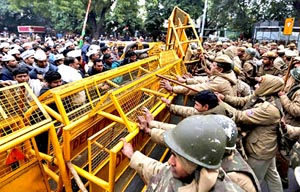New Delhi, May 27: The Delhi High Court today advised Arvind Kejriwal, who has been lodged in Tihar Jail, to furnish a bail bond in the criminal defamation complaint filed against him by BJP leader Nitin Gadkari.
A bench of justices Kailash Gambhir and Sunita Gupta said Kejriwal can raise whatever legal issues he wants to, once he comes out of jail and that he should not make it a prestige issue.
After senior advocate Shanti Bhushan and advocate Prashant Bhushan, appearing for Kejriwal, sought to meet the Aam Aadmi Party (AAP) leader in prison to seek his instruction and put forth the court's suggestion, the bench allowed themto meet him anytime before 1 PM.
The court will now hear the matter at 3 PM.
The judges advised Kejriwal to furnish the bail bond and said that the same would be subject to final outcome of the legal issues raised by him.
The legal issue raised by Kejriwal, in his petition seeking his immediate release from the jail, is whether bail bond is necessary in summons case when accused appears and is accompanied by a lawyer.
The petition challenged the May 21 and 23 orders of a magisterial court remanding Kejriwal in judicial custody for not furnishing bail bond in the criminal defamation complaint filed by Gadkari, saying the same was not mandatory and he should have been allowed to give a written undertaking instead.
Kejriwal in his plea, filed through advocate Rohit Kumar Singh, has said the magisterial order sending him to judicial custody was "illegal" as it was based on a "completely wrong premise of law."
During the proceedings, the bench suggested that Kejriwal should furnish bail bond and challenge the magisterial orders once he comes out of jail.
It also questioned how a habeas corpus, filed on behalf of Kejriwal, applies against a judicial order. A writ of habeas corpus is used to bring a prisoner or detainee before the court to determine if the person's imprisonment or detention is lawful.
Kejriwal's counsel argued that his detention is "totally illegal" as only a person in custody is required to furnish bail bond.
The counsel argued that Kejriwal had appeared in pursuance to summons of the court and was accompanied by a lawyer and, therefore, there was no need for him to furnish bail bond, especially when he was willing to give an undertaking.
They said the requirement of pre-trial bail in the current situation is an antiquated practice which is absent in socially developed and forward nations like the US.
When the accused was present in court with counsel in pursuance to its summons, then there was no need to direct him to furnish bail bond, the counsel argued.
Senior advocate Pinky Anand, appearing for Gadkari, opposed the habeas corpus plea, saying such a petition was not maintainable against judicial orders.
She also argued that under the law, every person is required to furnish bail bonds in such cases to ensure his presence.
She also objected to Kejriwal's conduct in the jail by having written an open letter questioning the magisterial orders sending him to judicial custody.
A former Delhi Chief Minister, Kejriwal was sent to judicial custody by a magistrate on May 21 for two days. On May 23, his custody was extended by 14 days till June 6 after he refused to furnish a bail bond when he was granted bail in the case.
The magistrate had refused to review its May 21 order remanding Kejriwal in judicial custody for not furnishing the bail bond and had asked him to approach the higher court, challenging the decision.
Kejriwal was earlier summoned as an accused by the court in the defamation complaint in which Gadkari had alleged that he was defamed by the AAP leader, who had included his name in the party's list of "India's most corrupt".
On May 21, the court had granted bail to Kejriwal in the defamation complaint, saying the offence under Section 500 of IPC was bailable and had asked him to furnish a personal bond.
He, however, was taken into custody after he refused to give the bail bond, saying the case was politically motivated and he does not wish to seek bail. He had said that he was ready to give an undertaking that he would appear in the court whenever required.
The court had on February 28 summoned Kejriwal as an accused in the case, observing that statements allegedly made by the AAP leader have the effect of "harming the reputation" of the complainant.





Comments
Add new comment